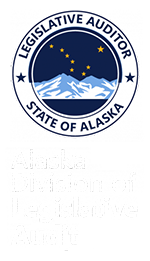| SUMMARY OF: | A Special Report on the Department of Commerce, Community, and Economic Development (DCCED) and the Department of Revenue (DOR), Alaska Film Production Tax Incentive Program (AFPTIP), Financial Compliance, February 29, 2012 |
Purpose of the Report
In accordance with Title 24 of the Alaska Statutes and a special request by the Legislative Budget and Audit Committee, we have conducted a financial compliance audit of the AFPTIP. The AFPTIP is administered by DCCED’s Alaska Film Office (AFO) in cooperation with DOR’s Tax Division. The primary objectives of the audit were to:
- Identify Alaska Film Production Tax Credits (film tax credits) issued and redeemed by fiscal year, and determine whether the total film tax credits issued have exceeded the statutory cap of $100 million.
- Determine whether film tax credits were made available to qualified producers and whether the AFO appropriately approved productions after determining the productions were not contrary to the State’s best interests.
- Determine whether film tax credits were correctly calculated in accordance with AS 44.33.235(b)-(c) and (g) and whether producers spent a minimum of $100,000 in qualified expenditures in an agreed upon 24-month period as supported through verification by an independent certified public accountant (CPA).
- Determine whether film tax credits were used within three years of being issued to exclusively offset corporate income taxes.
Report Conclusions
The AFO and Tax Division generally adhere to film tax credit approval, issuance, and redemption statutes and regulations when administering the AFPTIP. Film tax credits are made available to qualified producers, are properly calculated using qualified expenditures, and are appropriately approved. The approved film tax credits included $100,000 or more of qualified expenditures that weregenerally incurred within the qualified 24-month expenditure period. Total film tax credits issued have not exceeded $100 million, and all redeemed AFPTIP credits have been used within three years of being issued to offset corporate income taxes. Detailed schedules of prequalified productions and approved film tax credits are included in the report as Appendices A and B respectively.
Although state agencies materially complied with AFPTIP approval, issuance, and redemption statutes and regulations, areas for improvement were identified in the approval and redemption processes.
Findings and Recommendations
- DCCED’s Division of Economic Development director and AFO development specialist should develop clear and measurable criteria to support best interest determinations.
- The AFO development specialist should ensure that expenditures reported as reviewed by a CPA are within the 24-month qualifying period.
- The AFO development specialist should ensure that the names of the director and proposed cast are included in the prequalification application as required by statute.
- The Tax Division director should improve procedures for tracking and reporting the use of tax credits.

